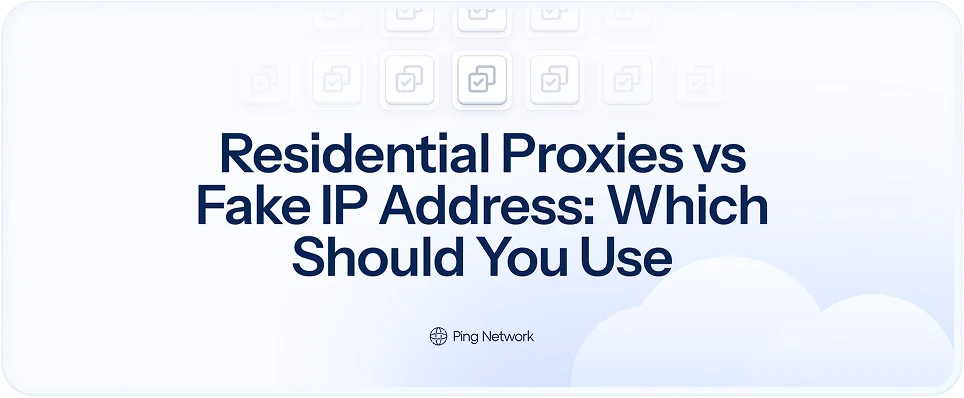September 26, 2025
Residential Proxies vs Fake IP Address: Which Should You Use

TL;DR
Fake IPs (VPNs, basic datacenter proxies) can mask your address, but they’re often flagged by modern websites. Residential proxies, assigned by real ISPs to real homes, look like genuine user traffic and deliver far higher success rates. For scraping, ad verification, geo targeting, or multi-account management, residential IPs are the clear choice. Ping Network’s universal bandwidth layer provides global residential IPs, on-demand scaling, and API-first routing for stable operations at scale.
Introduction
With privacy rules, geo restrictions, and anti-bot defenses growing stronger, choosing the right proxy matters. Your choice between fake IPs and residential proxies can decide whether your campaigns scale reliably or get blocked quickly.
This guide explains the difference, shows where each option fits, and why residential proxies paired with Ping Network deliver the trust, stability, and geo accuracy needed for serious workflows.
This guide explains the difference, shows where each option fits, and why residential proxies paired with Ping Network deliver the trust, stability, and geo accuracy needed for serious workflows.
What Is a Fake IP Address?
A fake IP usually comes from a VPN or datacenter proxy. These IPs are hosted in server farms, not real households, and are easily flagged.
How fake IPs work:
How fake IPs work:
- Connect to a VPN or datacenter proxy server.
- Traffic exits with that server’s IP.
- Target sites see a non-residential IP and often classify it as risky.
- Quick geo unlocks for light browsing
- Evading minor bans
- Low-risk anonymity
- Higher block rates on protected sites
- Shared IP ranges trigger CAPTCHAs and throttling
- Poor reputation for logins, carts, or scraping
What Are Residential Proxies?
Residential proxies use IPs assigned by ISPs to real homes. Traffic looks like it comes from an ordinary user, which aligns with anti-bot expectations.
How they work:
How they work:
- Your requests route through a residential node.
- Exit IP belongs to a real household.
- Sites see natural user traffic, lowering block rates.
- Large-scale scraping and market research
- Ad verification and price monitoring
- Managing multiple accounts
- Unlocking geo-restricted content
Residential Proxies vs Fake IPs: Key Differences

Why Residential Proxies Win for Serious Work
- Trust & Reputation — Residential IPs align with normal consumer patterns, passing reputation checks.
- Scraping & Automation Success — Residential routes bypass obvious datacenter fingerprints, reducing 403s/429s.
- Precise Geo Targeting — Test real local prices, inventory, and ads.
- Stable Identities — Sticky residential sessions keep cookies & device profiles consistent.
- Better ROI — Fewer retries, fewer bans, and cleaner datasets save costs.
Where Fake IPs Still Make Sense
- Casual content access
- Temporary tests on non-protected endpoints
- Internal tools for low-risk tasks
- For any campaign facing real anti-bot defenses, fake IPs quickly hit a ceiling.
Build It Right With Ping Network
Most vendors sell static proxy pools. Ping Network provides a universal bandwidth layer that powers proxies, VPN routing, scraping, uptime monitoring, and even CDN-like workloads via one integration.
What Ping offers:
What Ping offers:
- Real residential IPs across 150+ countries
- On-demand scaling for concurrency without delays
- API-first controls for rotation, stickiness, and geo targeting
- Decentralized resilience with 99.9999% uptime
- Cost efficiency with pay-as-you-go pricing
- Static residential for account management & checkout testing
- Rotating pools for discovery crawls & large-scale scraping
- Hybrid: static for logins, rotating for parallel fetches
Best Practices
- Match IP geo to your target market.
- Limit concurrency per IP; rotate for retries.
- Maintain consistent headers, time zones, and device profiles.
- Log response codes, CAPTCHAs, and block reasons by region.
- Separate sensitive account tasks from high-volume scraping.
FAQ
Do residential proxies always beat VPNs?
For protected sites and automation, yes. Residential traffic aligns with consumer norms.
Static or rotating residential?
Use static for logins and continuity, rotating for retries and discovery. Most teams combine both.
Can residential proxies improve ad verification?
Yes—by showing placements exactly as real local users see them.
Will residential proxies fix every block?
No. You still need realistic headers, sane concurrency, and backoff logic.
Conclusion
For scraping, ad verification, geo testing, or account management, residential proxies deliver better trust, stability, and accuracy than fake IPs.
With Ping Network’s universal bandwidth layer, you get:
Book a call with our team and see how Ping Network powers your workflows.
📖 Docs
With Ping Network’s universal bandwidth layer, you get:
- Global residential IPs
- Instant, API-driven scaling
- Sticky sessions for stability
- Decentralized resilience
Book a call with our team and see how Ping Network powers your workflows.
📖 Docs




